Text
On Himalaya's steps

5 notes
·
View notes
Text
*guy who's always itching to check out the manuscripts* maybe the answer we seek is in the manuscripts? the ancients of old had wisdom far beyond ours in their manuscripts!
23K notes
·
View notes
Text

Great T'Phon Shrugged
i actually think in certain kinds of fantasy you shouldn’t make the world round, or at least not a sphere floating in space obeying regular orbital mechanics. i think that invites considering the universe from a more SF-type perspective than a fantasy one, and anyway, part of the fun of fantasy is experimenting with exotic cosmologies. middle-earth is round only because it is an imagined past of our world (and it didn’t start out that way); narnia has an edge; i don’t think the world is asoiaf has a canonical geometry, but it could be almost anything, its author doesn’t have a great sense of scale anyway
bonus: if your world is flat, like Discworld, you don’t have to futz with map projections!
163 notes
·
View notes
Text
There is no middle room: you must allow the archivist impulse to take over your life and set yourself up in a sprawling library of ephemera that you will never begin to read all of, or you must burn your diaries. You cannot compromise between eternity and instant.
trying to free up space on my computer while also not deleting any of my downloaded books or art or movies has me feeling like that dril tweet about candles
220 notes
·
View notes
Text
Alien assuming all of these are the same language and going mad trying to get a grip on Human from it
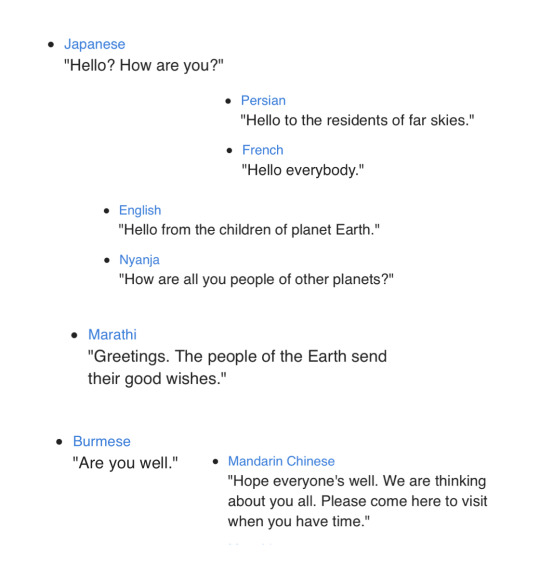
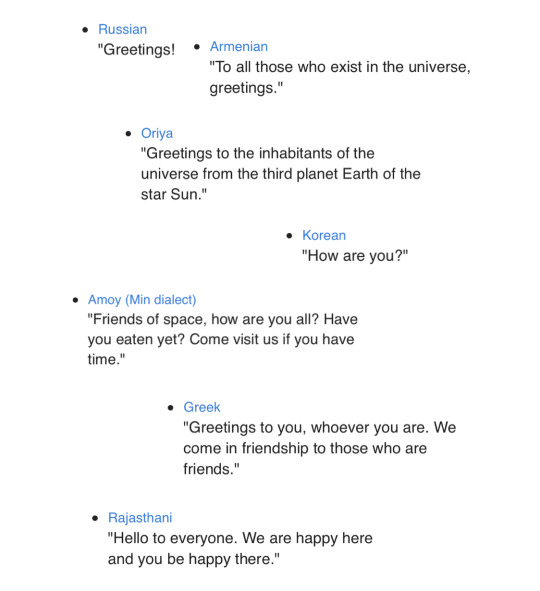
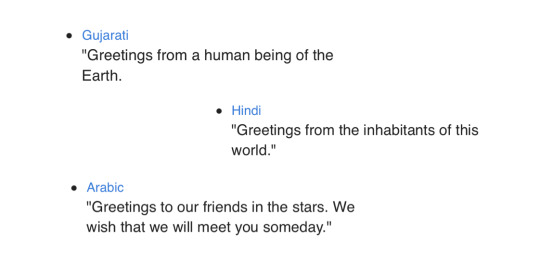
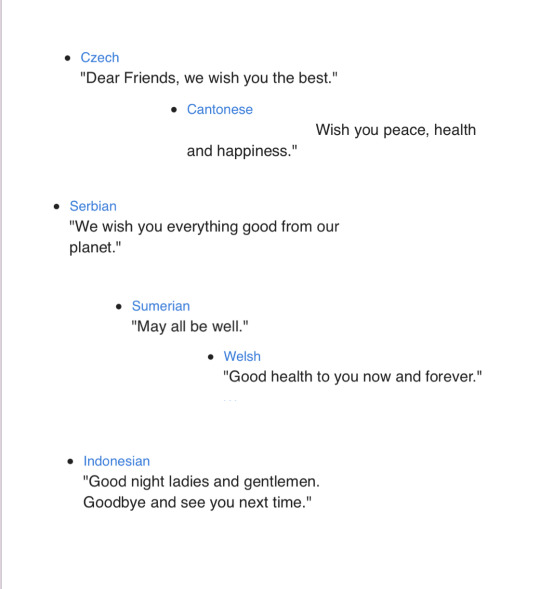
"Greetings to the Universe in 55 Different Languages", a poem compiled out of messages from the Voyager spacecraft
89K notes
·
View notes
Text
Pegana Illustrated

The Gods of Pegāna
Pegana frontispiece
8 notes
·
View notes
Note
They are also a Pan-Westeros institution that predates the united Westeros and is united at the very end of one kingdom - a Night’s Watch where you can have children, will eventually just become an Just Another Kingdom, and one which upon exercising its power will just lose its goodwill, especially from its neighbor, which seems to be its No. 1 supplier. So it will be a belligerent or subservient kingdom, neither of which will suit it to its original purpose of guarding against a great pre-historic evil.
Though to be fair, nothing beyond inertia and being a far-away prison camp seems like a good reason for the non-Northern kingdoms to keep supplying the Night’s Watch over eight thousand years, so you know - the mythos of it plays a big role. Seems like the other Westerosi kingdoms would have benefitted more from a permanent occupation of the Iron Islands during the vast gap between the known Others Invasions than protecting the North against *people without access to steel*.
Martin and his time-gaps play a part in this - I still think it’s a really striking idea, despite the logistics of maintaining it over that amount of time. And of course, he hasn’t yet fully explicated the magical side of it.
Giving up claims on titles and lands makes sense, but would it have been better for The Night's Watch practically to allow marriage / children? That way, while you'd still get exiles, prisoners and volunteers, generations down the road you'd have a wider self substaining backbone of watchmen / presumably still having some who are proud of it "seven generations my family has served!" rather than being mostly forced to be there
Two things:
The Night’s Watch is drawing inspirations from the monastic military orders like the Knights Templar and Knights Hospitalier, which did mandate an oath of celibacy in our own history.
The Night’s Watch believes that raising a family creates conditions that would inspire dereliction of duty such as cowardice to return home to loved ones or conflicting loyalties between family and mission. In this, they’re completely wrong - soldiers have been having families in our own history for thousands of years. But it is a coherent train of thought from beginning to end, wrong at it is.
Thanks for the question, Anon.
SomethingLikeALawyer, Hand of the King
73 notes
·
View notes
Text
the ability to get gay married for political connections & power regardless of if you're gay or not is the only thing that could make the late republic funnier actually
2K notes
·
View notes
Text
I’m not well-read enough in the relevant fields to argue this point convincingly, or even to be all that confident about it, but I certainly have the impression that the modern approach to syntax has, in a way, distorted understanding of language in the context of computing, and projects like language models. By that I mean: language is an emergent phenomenon that arises out of a diverse set of cognitive faculties, some of which are very old in our evolutionary line, and some of which are much newer. (I think the whole “language organ” concept is pretty useless and misleading.) But a focus on studying the structure of language as a set of, like, minimal rules meant to produce things that look like well-formed language–and onto which it is easy for us to interpolate meaning because they use symbols familiar to us–or using elaborate tools for statistical prediction, seems like it is always going to run into a great deal of difficulty when trying to apply language to specific purposes.
For example: it’s not so crazy to me that training a language model on literally the entire accessible Internet, or some other huge corpus of data, will, with sufficiently advanced techniques, produce a system you can ask “what is the current political situation in Djibouti,” and which can then summarize the contents of a bunch of news articles. It’s impressive as a computational task, but disappointing as an exercise in language modeling: while I think the poverty of the stimulus argument is overrated, it’s definitely true that humans don’t have to consume nearly as much training data as a computer to produce a well-formed sentence in their native language, much less to talk about current events in a country they may know little about. I know that “computers aren’t yet as smart as people at most tasks” isn’t exactly a blistering-hot take, but it does make me pretty skeptical that all the new AI technologies we currently have are going to have much in the way of meaningful practical applications. If you ask a human a question they don’t have a good answer to, they can say, “I’m not sure, but I think…” or “I don’t know.” GPT-style bots can’t even do that.
(In fact, I suspect one reason they seem so impressive is that they will always produce some output for a given prompt, and as a user we cannot see how well that answer is actually supported by the training data, and we are often blind to our own ability to paper over discontinuities or lacunae in the apparent meaning with our own tendency to supply context. Even famously content-less nonsense sentences like “colorless green ideas sleep furiously” can be very evocative to humans, because we will supply meaning where we cannot discover it. Our brains are optimized for identifying patterns, not falsifying them.)
Tasks like summarizing a book or complex information seem like the kind of task that might require, or at least greatly benefit from, not just a minimal programmatic or statistical treatment of language that can be brute-forced with a sufficiently large corpus, but an engagement with other cognitive faculties that human language is built on. But we still don’t understand most of those faculties very well; much of the basic architecture of our minds is still a mystery to us. The Chomsky-style approach to language seems to have convinced a generation of people studying language, and trying to get computers to produce language, that language is a pretty highly restricted or narrowly focused set of abilities in the human brain, and that it can be cracked (more or less) without understand more about deeper neural architecture. I’m very skeptical of that idea. And I suspect that the current methods will hit their limits in the not too distant future, and when that happens, and they prove not to be a useful path to other, more sophisticated kinds of artificial intelligence, some people are going to be a lot more surprised than they should be.
17 notes
·
View notes
Text

Alfred R. Thomson (English, 1894–1979) - Atrani, near Amalfi
26 notes
·
View notes
Note
A thought I had:
"History will call us wives" always stuck with me as a final line, because it is off-beat, and seems an odd place to end Dune. Jessica's status as a concubine is heart-felt in the first half, but hardly as important as the more overt SF thmes of destiny or myth, or the more overt political stuff. But then, it's not unrelated to those topics either.
Jessica and Chani had personal, loving relationships to their ersatz-husbands, and were part of their political efforts: ofc, as concubines in a male-dominated society, their role is primarily reproductive. Jessica is sort of celebrating that: she and Chani birthed the successive generations, they are part of the dynasty genetically. They are part of that history, that destiny mentioned before: with the genetic memory, that is the only place to be, historically.
"History will call us wives" - "History will remember us, because we birthed history" - "We were a part of history". This becomes key to how genetic history is used in the Dune-saga then. The personal becomes the political
Maybe this is all very obvious, but I hadn't thought about it like this before, just thought of the triumph in status. Can't say I see how it relates to the God-Emperor Worm yet though.
A friend of mine (male) has been trying to convince me (female) that Dune is misogynistic, particularly the last scene (history will call us wives).
That scene never made me feel uncomfortable as a woman at all, but I can’t quite put into words why, what do you think?
I think in many ways Dune is more progressive than a lot of other sci-fi written by men in its time, but it is often very much a product of a kind of essentialist “men are like this and women are like this” way of thinking that, IMO, gets a little ickier as the series goes on. You may be interested in this post I made about gender in Dune. I don’t think the “history will call us wives” but is particularly bad though - what was your friend’s reasoning?
18 notes
·
View notes
Text
thinking about the parallels between zombie hector in aeneas's dream in book 2 and zombie aeneas coming up out of the underworld in book 6
143 notes
·
View notes
Photo




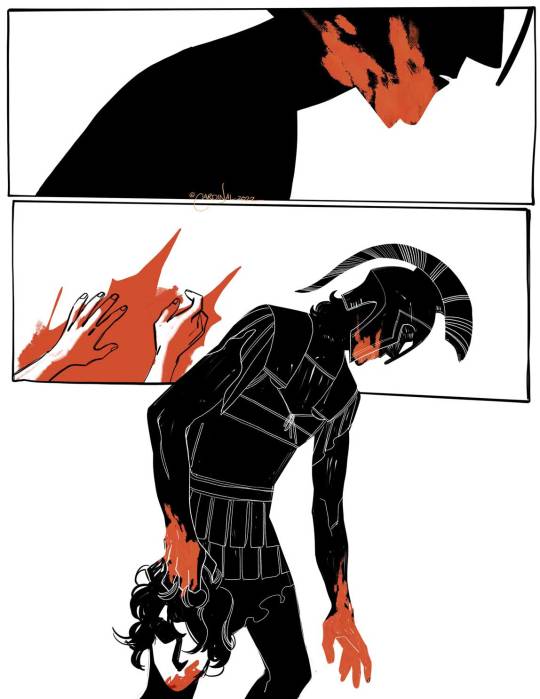
AKHILLEUS MURDERS TROILOS ON TEMPLE STEPS
while a statue of apollo watches, and the god plans revenge








Sophocles: Selected Fragmentary Plays, A.H Sommerstein, D. Fitzpatrick, T. Talboy [Sophocles: Troilus]
society6 | ko-fi | redbubble | twitter | deviantart
6K notes
·
View notes
Text

This cover from a Brazilian 2021 edition is my favorite for reasons that I think are obvious lol
20K notes
·
View notes
Text
174 notes
·
View notes









